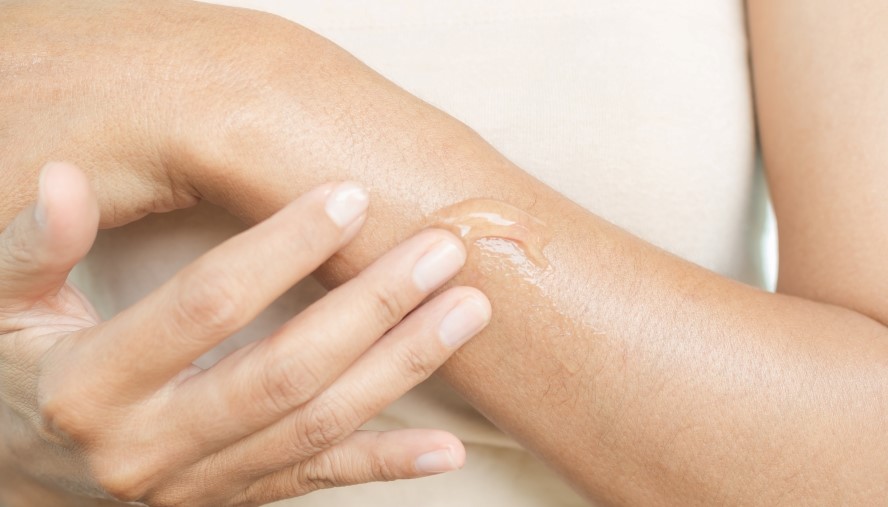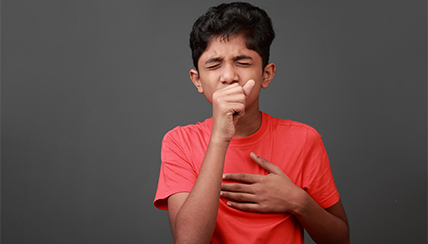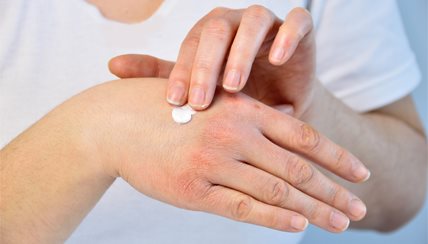Search Clinical Trials
Our researchers are currently in need of adult and pediatric study participants to help us pursue better treatments and cures. Participants may receive medical evaluations and procedures, study medication, disease-related education and possible financial compensation for time, travel and participation.
Select a Condition or Specialty
- Allergy
- Alpha-1 Antitrypsin Deficiency
- Asthma
- Bronchiectasis
- Cardiology
- Chronic Obstructive Pulmonary Disease (COPD)
- COVID-19 (Coronavirus)
- Cystic Fibrosis
- Eczema (Atopic Dermatitis)
- Environmental & Occupational Health
- Eosinophilic Granulomatosis with Polyangiitis (EGPA)
- Food Allergy
- Gastroenterology
- Idiopathic Pulmonary Fibrosis (IPF)
- Interstitial Lung Disease (Pulmonary Fibrosis)
- Lung Cancer
- Nontuberculous Mycobacteria (NTM)
- Oncology
- Pulmonary Hypertension (PH)
- Respiratory (Pulmonary)
- Rheumatology
- Sarcoidosis
- Sleep
All Clinical Trials

Exploring New Investigational Topical Treatment for Moderate Eczema
Researchers are investigating a potential new, non-steroid skin cream for moderate eczema in children and teens who have not responded well to other topical eczema treatments. Volunteers are needed. Learn how your child can participate.
- Gender
- Any
- Ages
- 6-17
- Compensation
- Provided
- Time Required
- up to 16 clinic visits over 70 weeks

Can Skin Bacteria Treat Atopic Dermatitis?
A new study is evaluating if a type of bacteria that normally lives on the skin can help reduce eczema symptoms. Volunteers 12 years and older are needed.
- Gender
- Any
- Ages
- 12+
- Compensation
- Provided
- Time Required
- 7 study visits over approximately 20 weeks

Skin, Airway & Esophageal Epithelial Barriers in Youth
Researchers want to better understand if the causes of asthma, eczema, food allergies, eosinophilic esophagitis and GERD can be determined at a cellular level.
- Gender
- Any
- Ages
- 2-21
- Compensation
- Provided
- Time Required
- Not Specified

Atopic Dermatitis & Skin Infections
National Jewish Health researchers are trying to determine why people with atopic dermatitis or eczema are more susceptible to bacterial infections. Learn how you can participate in our research study.
- Gender
- Any
- Ages
- 18-65
- Compensation
- Provided
- Time Required
- Up to 3 visits or approximately 3 hours
.jpg?lang=en-US&ext=.jpg)
Understanding Skin Problems from Eczema and Food Allergies
Researchers are studying the differences in the skin and immune cells of people with food allergies and eczema, and those without.
- Gender
- Any
- Ages
- Not Specified
- Compensation
- Provided
- Time Required
- Not Specified
Adult Trials

Can Skin Bacteria Treat Atopic Dermatitis?
A new study is evaluating if a type of bacteria that normally lives on the skin can help reduce eczema symptoms. Volunteers 12 years and older are needed.
- Gender
- Any
- Ages
- 12+
- Compensation
- Provided
- Time Required
- 7 study visits over approximately 20 weeks

Skin, Airway & Esophageal Epithelial Barriers in Youth
Researchers want to better understand if the causes of asthma, eczema, food allergies, eosinophilic esophagitis and GERD can be determined at a cellular level.
- Gender
- Any
- Ages
- 2-21
- Compensation
- Provided
- Time Required
- Not Specified

Atopic Dermatitis & Skin Infections
National Jewish Health researchers are trying to determine why people with atopic dermatitis or eczema are more susceptible to bacterial infections. Learn how you can participate in our research study.
- Gender
- Any
- Ages
- 18-65
- Compensation
- Provided
- Time Required
- Up to 3 visits or approximately 3 hours
.jpg?lang=en-US&ext=.jpg)
Understanding Skin Problems from Eczema and Food Allergies
Researchers are studying the differences in the skin and immune cells of people with food allergies and eczema, and those without.
- Gender
- Any
- Ages
- Not Specified
- Compensation
- Provided
- Time Required
- Not Specified
Pediatric Trials

Exploring New Investigational Topical Treatment for Moderate Eczema
Researchers are investigating a potential new, non-steroid skin cream for moderate eczema in children and teens who have not responded well to other topical eczema treatments. Volunteers are needed. Learn how your child can participate.
- Gender
- Any
- Ages
- 6-17
- Compensation
- Provided
- Time Required
- up to 16 clinic visits over 70 weeks

Can Skin Bacteria Treat Atopic Dermatitis?
A new study is evaluating if a type of bacteria that normally lives on the skin can help reduce eczema symptoms. Volunteers 12 years and older are needed.
- Gender
- Any
- Ages
- 12+
- Compensation
- Provided
- Time Required
- 7 study visits over approximately 20 weeks

Skin, Airway & Esophageal Epithelial Barriers in Youth
Researchers want to better understand if the causes of asthma, eczema, food allergies, eosinophilic esophagitis and GERD can be determined at a cellular level.
- Gender
- Any
- Ages
- 2-21
- Compensation
- Provided
- Time Required
- Not Specified
.jpg?lang=en-US&ext=.jpg)
Understanding Skin Problems from Eczema and Food Allergies
Researchers are studying the differences in the skin and immune cells of people with food allergies and eczema, and those without.
- Gender
- Any
- Ages
- Not Specified
- Compensation
- Provided
- Time Required
- Not Specified
Healthy Participant Trials

Exploring New Investigational Topical Treatment for Moderate Eczema
Researchers are investigating a potential new, non-steroid skin cream for moderate eczema in children and teens who have not responded well to other topical eczema treatments. Volunteers are needed. Learn how your child can participate.
- Gender
- Any
- Ages
- 6-17
- Compensation
- Provided
- Time Required
- up to 16 clinic visits over 70 weeks

Can Skin Bacteria Treat Atopic Dermatitis?
A new study is evaluating if a type of bacteria that normally lives on the skin can help reduce eczema symptoms. Volunteers 12 years and older are needed.
- Gender
- Any
- Ages
- 12+
- Compensation
- Provided
- Time Required
- 7 study visits over approximately 20 weeks

Atopic Dermatitis & Skin Infections
National Jewish Health researchers are trying to determine why people with atopic dermatitis or eczema are more susceptible to bacterial infections. Learn how you can participate in our research study.
- Gender
- Any
- Ages
- 18-65
- Compensation
- Provided
- Time Required
- Up to 3 visits or approximately 3 hours
.jpg?lang=en-US&ext=.jpg)
Understanding Skin Problems from Eczema and Food Allergies
Researchers are studying the differences in the skin and immune cells of people with food allergies and eczema, and those without.
- Gender
- Any
- Ages
- Not Specified
- Compensation
- Provided
- Time Required
- Not Specified
